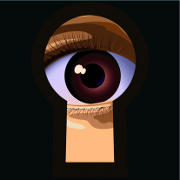When it becomes harder to see at night or in an environment with low light, the condition is called nyctalopia, or night blindness. One common concern for people with night blindness is safety when driving at night.
The portion of the eye that recognizes light is called the retina. The retina lines the inside of the back of the eye and is filled with light receptors called cones and rods. Cones help the eye see in color while rods see black and white images. Rods also do most of the work of seeing when we are in an environment with low light. Night blindness occurs when something damages the rods.
Causes of Night Blindness
Some people are born with night blindness, but for the majority of people, night blindness develops over time and is often associated with the aging process. Causes of night blindness include:
• Birth defects
• Low Vitamin A – This vitamin acts as an antioxidant and is known to be important in producing pigments in the eye. Low levels of Vitamin A in the body can lead to night blindness and other vision problems. Appropriate levels of Vitamin A can help prevent night blindness and may also help prevent cataracts and macular degeneration.
• Cataracts – This clouding of the cornea of the eye reduces vision and is a leading cause of night blindness.
• Degeneration of the retina – Retinitis pigmentosa is one example of an eye disease where damage occurs to the retina. This type of problem tends to get worse as we get older.
• Use of certain drugs - Symptoms of night blindness may come on gradually and initially be difficult to detect. Patients may first notice that it seems to take the eyes longer to adjust when looking from a well lit area to a darker area. This can become a serious hazard when driving at night because it may take the eyes several seconds to adjust after the bright lights of an on-coming car have passed by.
Risk Factors for Night Blindness
You may be at higher risk to develop nyctalopia if you have one or more of these risk factors:
• Age – Elderly people are more likely to have night blindness, in large part because they are more likely to have cataracts. Surgery to correct cataracts may also eliminate this type of night blindness.
• Diet – Not eating a balanced diet including enough sources of Vitamin A can put you at risk. You can get Vitamin A as part of a balanced diet when you eat animal products including liver, milk, eggs, cod, and halibut fish oil. You can also find low fat sources of Vitamin A in a variety of vegetables including carrots, sweet potatoes, winter squash and leafy greens.
• Inability to absorb vitamin A – People who are eating adequate foods that are sources of Vitamin A but whose bodies cannot absorb the vitamin are also at higher risk. Disorders that can affect vitamin absorption include liver disorders, liver or pancreas surgery, bowel surgery for obesity, and intestinal conditions.
Treatment for Night Blindness
Appropriate treatment will vary depending on the cause of night blindness and may include:
• Surgery to treat cataracts
• Vitamin A supplements
• Glasses or other aids to improve vision
If you believe you are having a harder time seeing in low light, schedule an appointment with your eye care professional for an evaluation.
Sources:
New York University Langone Medical Center
National Institutes of Health: Medline Plus
All About Vision





Add a CommentComments
There are no comments yet. Be the first one and get the conversation started!